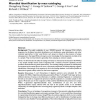Free Online Productivity Tools
i2Speak
i2Symbol
i2OCR
iTex2Img
iWeb2Print
iWeb2Shot
i2Type
iPdf2Split
iPdf2Merge
i2Bopomofo
i2Arabic
i2Style
i2Image
i2PDF
iLatex2Rtf
Sci2ools
BMCBI
2006
2006
Microbial identification by mass cataloging
Background: The public availability of over 180,000 bacterial 16S ribosomal RNA (rRNA) sequences has facilitated microbial identification and classification using hybridization and other molecular approaches. In their usual format, such assays are based on the presence of unique subsequences in the target RNA and require a prior knowledge of what organisms are likely to be in a sample. They are thus limited in generality when analyzing an unknown sample. Herein, we demonstrate the utility of catalogs of masses to characterize the bacterial 16S rRNA(s) in any sample. Sample nucleic acids are digested with a nuclease of known specificity and the products characterized using mass spectrometry. The resulting catalogs of masses can subsequently be compared to the masses known to occur in previously-sequenced 16S rRNAs allowing organism identification. Alternatively, if the organism is not in the existing database, it will still be possible to determine its genetic affinity relative to the ...
| Added | 10 Dec 2010 |
| Updated | 10 Dec 2010 |
| Type | Journal |
| Year | 2006 |
| Where | BMCBI |
| Authors | Zhengdong Zhang, George W. Jackson, George E. Fox, Richard C. Willson |
Comments (0)

